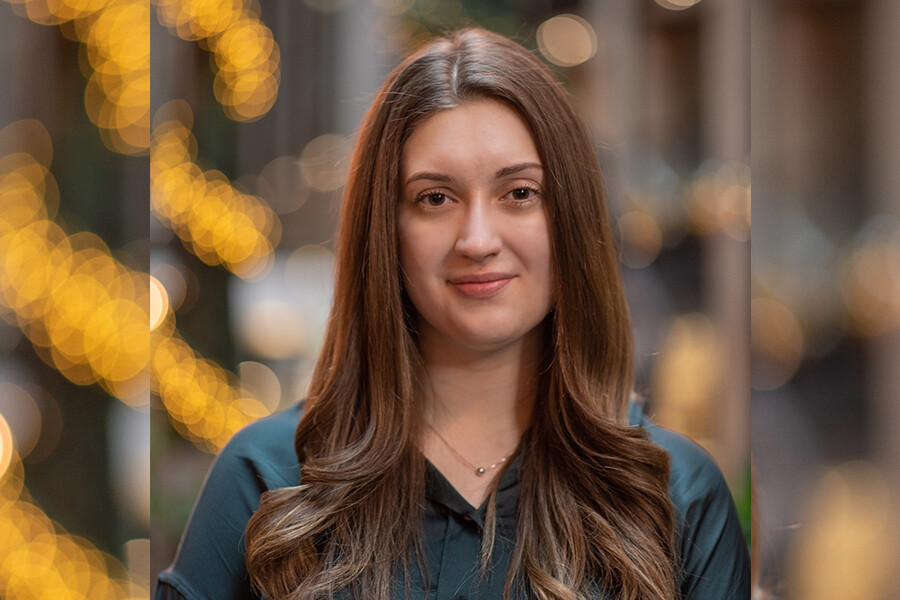Humans of LMP: Janine Noorloos

Each month we speak to a member of the Laboratory Medicine and Pathobiology community and find out more about them as part of an initiative from our Wellness, Inclusion, Diversity and Equity Committee (WIDE).
This month we feature Translational Research Program student, Janine Noorloos.
Visit the Humans of LMP page to read more stories and nominate yourself or others to be featured.
What are you studying at LMP and why are you interested in studying it?
I joined the Translational Research Program at LMP after completing a Bachelor of Music. Throughout my undergraduate degree in violin performance, I was an active member in my community and enjoyed volunteering at the local men’s shelter in Kitchener. After winning the concerto competition at Laurier in 2019, I was lucky enough to be performing Beethoven’s Violin Concerto with the symphony. One of my rehearsals conflicted with the time I normally volunteered at the shelter. My perspective shifted, as I realized I wanted to be at the shelter more than I wanted to be performing on stage.
I took an extra year before graduating from Laurier to then take courses in sociology, criminology, research methods, and community engagement. I worked as a research assistant and started to see the value data could provide in community-based settings.
Throughout this time, I was in a shelter supervisor position, did outreach work for a mobile community health van, and ran an Out of the Cold shelter.
These experiences cultivated my interest in the intersection between homelessness and health which motivated me to join the TRP.
The TRP is interdisciplinary, and project-based. Over the past year, some of my projects have been on sickle cell disease, supporting individuals with a dual diagnosis, bringing medical devices to market, and on the relationship between chronic pain and insomnia. The skills I gained from these projects have already been beneficial for me professionally for my work in healthcare and social services.
What is the most interesting thing you’ve done, seen or got involved with while at LMP?
One of my favourite experiences was the opportunity as a first-year graduate student to present a poster alongside my team (Geil Astorga, Fairuz Karim, Peola Ellis, and Jaspreet Randhawa) at the LMP research conference at the end of April.
Our poster showcased a project on sickle cell disease which we started in our first semester. Dr. Chris Klinger and Dr. Raza Mirza were very supportive mentors throughout the year. My team also recently received the Young Researchers’ Award grant from the Sickle Cell Awareness Group of Ontario which will support the capstone project we undertake over the next year. We thank Dr. Joseph Ferenbok for his support with our application and the project.
What was the best career advice you ever received?
Firstly, one of the best pieces of advice I have received was to never stop learning. Additionally, the importance of mindset and outlook. On both good and difficult days, I always remind myself that I “get to” do something, not that I “have to”.
What has been an important learning experience in your life?
One of the most important learning experiences in my life was working in shelter and supporting people experiencing homelessness throughout the pandemic. Shelter and street outreach work remain close to my heart and motivate me every day to get up to do the work I do.
Who is an influential person in your life and why?
My father has been a very influential person in my life. He is a farmer and is the hardest worker I have ever met. While his interests are very different from mine, he has always remained so supportive of any path I have chosen in life.
What would it surprise people to know about you?
My dream trip would be to visit the Antarctica!
What activities do you enjoy doing outside of your studies?
I dedicate my time as a volunteer with Victim Services, I enjoy running and being active, you will often find me playing violin with various local orchestras.
What is your favourite album, film and novel?
There is a Dutch violinist named Janine Jansen, and I grew up listening to her recording of Bach’s Partita in D Minor for violin. This remains to be one of my favourite albums.
I am more into TV shows than films, however, I am a fan of Marvel movies.
For fiction, one of the most influential novels I read while growing up was titled “The Cure for Death by Lightning” by Gail Anderson-Dargatz. While I am not sure I have a favourite novel, this book sparked my love for Canadian fiction. For nonfiction, my favourite book is titled “Beyond Shelters: Solutions to Homelessness in Canada from the Front Lines”, edited by James Hughes. Every chapter is an essay which is written by an experienced shelter leader.
Who would be your dream dinner guests?
I respect many composers and leaders, so this is a tough one! I will default and select one of each. I would love to have dinner with Johannes Brahms and Sam Tsemberis.
Where/what is your favourite place?
My family moved from the Netherlands to Canada during World War II. I had the opportunity to visit my grandparents’ hometown, Nieziji which is in the region Groningen, a few years ago. This continues to be one of my favourite places.
If you were stuck on a deserted island but had all your basic needs taken care of (i.e. food and water), what two items would you bring with you and why?
I would have my violin and a chessboard! I imagine I would have a lot of free time on a deserted island. I love my violin which could keep me very occupied, and I would also have the time to continue improving my chess skills.



